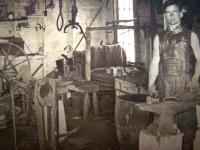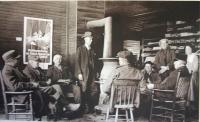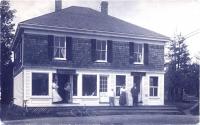Text by John Mitchell

Blacksmith, Islesboro, ca. 1890
Islesboro Historical Society
The island of Islesboro, located in the Penobscot Bay, has a long and rich history, as one of the last coastal areas to be settled, in the mid 1760s. Although it is understood the first settlers subsisted by farming and fishing, little documented information is known about the early businesses and trades till after the island's incorporation in 1789, except that many were involved in harvesting of wood for shipbuilding and heating purposes. Also, early notations in "Vital Records of Islesboro" indicate the frequent town recordings of sheep, hog and cattle markings, demonstrating that animal raising for sale and consumption was an important early industry to satisfy basic human needs.
During the 1800s, the needs of Islesboro residents probably were not significantly different from mainland families, except that island isolation, particularly during winter months prompted some local entrepreneurs to launch business ventures, which were helpful for survival and personal comfort to island families.

Lobster Trap, Islesboro, ca. 1980's; Bouy 1940's
Islesboro Historical Society
Being an island community, one would commonly assume that various forms of the fishing industry were vital to the economy of Islesboro. Early fishermen set nets for salmon and haddock. Cod was caught on trawls, mostly for island consumption. The fish weir industry developed around 1915 and continued to the late '40s, when the herring market faded and the cost of yearly rebuilding the weir made this historic venture obsolete. Clamming has been a small but energetic island industry, but in recent times it has been mostly shut down due to scarcity prompted by so called "red tide" and other forms of harbor pollution. Lobstering remains vibrant and a continuing industry conducted by several young and able island men, but the future of this endeavor has become seriously threatened by the huge cost of operation, reduced prices plus a wide and mostly unexplained inconsistency in the yearly catch.

Gilkey Livery Stable, Islesboro, ca. 1900
Islesboro Historical Society
When the population grew as summer visitors began to arrive at Islesboro during the mid-1860s, it became more necessary to provide further businesses and stores as a means of supporting and developing the island's resort industry. Early island contractors and builders were responsible for erecting the large summer homes for wealthy summer residents, who spent two to three months here. Islesboro became acclaimed for skilled contractors, stonemasons, master plumbers, electricians and painters.

Store Flyer, Islesboro, ca. 1890
Islesboro Historical Society
The influx of summer population made it possible for many other businesses to flourish. A real estate business was established during the 1880s and was known as the Islesboro Land and Improvement Company. This organization subdivided and brokered much of the Dark Harbor property to wealthy summer residents and promoted the island's summer resort industry, which had actually begun in the Ryder's Cove and Hewes Point settlements some twenty years earlier.
As the island filled with summer residents, many additional businesses and services became immediately necessary. Cottage caretakers and landscapers were urgently needed. Insurance representatives, laundries, express service, boat yards, livery stables and blacksmith shops were all present and island-based. As time passed most of these services have ended or diminished, due to changing times and in some cases provided for within the homes. The boat yard industry remains vital and constant for those families wealthy enough to enjoy this pastime common to coastal Maine. At this time, three boatyards serve the Islesboro community. Fewer summer visitors now bring domestic servants from their city homes, preferring to rely on islanders as cooks, interior home workers and nursemaids for children.

F.S. Pendleton and Company Store, interior, Islesboro, ca. 1930
Islesboro Historical Society
Through the years, Islesboro has been most fortunate to have established a variety of shops and stores to serve the pleasures and needs of island visitors and the native population. At mid-island the F. S. Pendleton and Company store existed for 100 years, specializing in groceries, hardware and ship chandler's supplies. In Dark Harbor, Williams Brothers operated a large grocery store featuring fancy goods, (ie: caviar, goose liver, specially packed canned foods from SS Pierce Co. in Boston etc.), meat, fish and produce for the expanding summer colony. During peak season delivery trucks hurried about to the summer cottages and large yachts, providing quick service to chefs who had placed their order earlier by phone. In the block adjacent to Williams Brothers stood a fish market, paint shop, movie and dance hall and an ice cream shop owned by E. M. Randlett. The ice cream shop still remains, now known as the Dark Harbor Shop.

Dark Harbor Post Office, Islesboro, ca. 1900
Islesboro Historical Society
Many other shops and businesses operated in Dark Harbor Village. Derby Road sported a candy and sundry shop, post office and library in one block. Across the street was a women's dress shop, operated by local businessman Walter Hall and a gas service station. Next to the block was a barbershop, another grocery store outlet, plumbing shop, Western Union, and at the end of the street the widely acclaimed Peg's Gift Shop, operated by the much loved Nellie Earle.
A plethora of other stores and businesses appeared throughout the island from time to time, serving certain populations and special needs, including a gristmill, saw mills and even a clam factory, which existed briefly during the 1950's

F.S. Pendleton Store, interior, Dark Harbor, ca. 1900
Islesboro Historical Society
As Islesboro's other businesses and stores developed during the 1920s and '30s, a new form of serving customers by home delivery began to take place, first by horse and buggy, later by delivery truck. These businesses proliferated during the '40s and '50s, when islanders had recovered from the Depression and were anxious to purchase new merchandise and fresh foods without traveling to the mainland. At its peak, homes were visited by the local fish merchant, who brought fresh seafood to the door, the baker with fresh bread and pastry, the shoe salesman with the latest footwear, the vegetable truck, the dairy wagon and even the local merchant who arrived in a large panel truck, laden with dresses and other feminine wear for the ladies. (Sometimes the dress of choice would be selected, only to find the belt missing, causing a delay of several minutes while the vendor frantically searched throughout the pile of dresses before finally locating the missing item). As access to the mainland improved, this unique island experience became a dying industry, with present door-to-door service being provided only by the Schwan frozen food truck.
Like most coastal communities, Islesboro has been home to many resourceful and flourishing cottage industries. Historically, the cottage industries were common in areas where a large percentage of local population was engaged in seasonal work, because families often had the time and desire to earn additional income during winter months when there was little to do. It was a test to the ingenuity of these highly skilled workers to produce top quality and unique creations and still be able to compete favorably against the mass-produced items.

Roxy Parker, Islesboro, 1930
Islesboro Historical Society
Netting was one of the earliest home industries on Islesboro. Nets supported the fishing industry, as they were needed for crab and lobster pots and other fishing endeavors. There are countless examples of the resourceful netting creations on Islesboro throughout the years. However, as mass production took over the industry, particularly from foreign countries where labor wages were much cheaper, netting has become much less remunerative for the hard work involved. At this time, netting is mostly a hobby among few; a near-forgotten home industry, reserved primarily for the small market existing for those who appreciate talented workmanship identified with a local name. For more information on this topic, please visit Netting on Islesboro video .
Other craftwork originating from home industry on the island includes pottery, jewelry making, furniture making, photography and various forms of artists' paintings. These crafts still flourish on the island, and are sold at various outlets, most importantly and successfully at the highly popular Arts and Craft Show, held each year at the Historical Society. Here local artisans pridefully display their creations to a grateful and supportive public.

Bicentennial Quilt, Islesboro, 1989
Islesboro Historical Society
The most historic and productive craft industry on Islesboro is the widely popular and successful Baptist Sewing Circle. For over 150 years, local ladies have been meeting to create and fashion the very best ideas from their whirring sewing machines heard from within their building. In addition to their innovative creations, the sewing circle is a generous and philanthropic group, providing meaningful donations to several town organizations each year. During the Annual Sewing Circle Fair, residents are given the opportunity to visit the many displays of their handiwork and make purchases for personal use or for gifts.
Another historic island endeavor is fulfilled by local quilters. Several island ladies have shown great skill in making quilts with intricate designs and patterns. Each year the annual quilt show brings island residents and visitors together to witness this magnificent display of historic and other not-for-sale creations, along with many new designs which can be purchased. Everyone looks forward to the yearly Quilt Show, even off-islanders who make special plans to arrive during this annual event.
Today's times have changed drastically, with frequent ferry service bringing mainland stores much closer, giving islanders many and varied choices of items to purchase at very competitive prices. Islanders are indeed fortunate that a few stores remain which still provide for basic consumer needs on a year round basis.